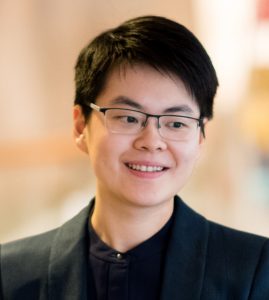Our poetry series focuses on writers who are BAME, queer and/or working class, and aims to to show what is exciting and innovative about poetry today. Unfortunately, due to the current situation, our York St John Poetry Series event for the York Literature festival was unable to take place live.
However, we didn’t want anyone to miss out on the fantastic poetry and analysis of our event writers, Khairani Barokka, Fran Lock and Mary-Jean Chan.
For this reason, Khairani, Fran and Mary Jean have all recorded special readings from their work which you can find in the soundcloud link below. They’ve also each taken the opportunity to respond to some of the questions we would have posed them, Khairani and Fran at the end of their recordings, and Mary Jean in writing. We are so grateful for them to taking the time to share their writing with us.
We hope you’ll take the time to enjoy these fantastic recordings.
Information on the writers:
Khairani Barokka is the writer/performer/producer of, among others, a deaf-accessible, solo poetry/art show, Eve and Mary Are Having Coffee. She is author and illustrator of poetry-art book Indigenous Species, nominated for a Goldsmiths Public Engagement Award (Tilted Axis Press, 2016; Vietnamese translation out in 2018 with AJAR Press), co-editor with Ng Yi-Sheng of HEAT: A Southeast Asian Urban Anthology (Fixi, 2016), and co-editor, with Sandra Alland and Daniel Sluman, of Stairs and Whispers: D/deaf and Disabled Poets Write Back (Nine Arches Press, 2017), shortlisted for a Saboteur Award for Best Anthology and a Poetry School Book of the Year Okka is currently working on a book and visual works. Her most recent exhibition was Annah: Nomenclature at the ICA. Her first full-length poetry collection, Rope, was published by Nine Arches Press in October 2017.
Mary Jean Chan is the author of Flèche (a Poetry Book Society Recommendation), published by Faber & Faber (2019). Her work has featured as a Guardian Poem of the Week and a Guardian Poem of the Month. Flèche is the winner of the 2019 Costa Book Awards (poetry category) and has been chosen as a Book of the Year by The Guardian, The Irish Times and The White Review. Her debut pamphlet, A Hurry of English (ignitionpress), was a 2018 Poetry Book Society Pamphlet Choice.
In 2016, Chan won the Oxford Brookes International Poetry Competition in the English as an Additional Language category. In 2017, she won the Poetry Society Anne Born Prize and the Institute of Psychoanalysis Poetry and Psychoanalysis Competition, and also came Second in the 2017 National Poetry Competition. The title poem from her debut collection won the 2018 Poetry Society Geoffrey Dearmer Prize. She has twice been shortlisted for The Forward Prize for Best Single Poem and is the recipient of a 2019 Eric Gregory Award.
Fran Lock is a sometime itinerant dog whisperer and poet, now living and working in London. Her debut collection Flatrock (Little Episodes) was launched in May 2011. Her work has appeared in various places, including Ambit, Poetry London, The Rialto, The Stinging Fly, and in Best British Poetry 2012 (Salt). Her second collection The Mystic and the Pig Thief (Salt) came out in September 2014. She is the winner of the 2014 Ambit Poetry Competition. She won third prize in The Poetry Society’s National Poetry Competition 2014. Her most recent book, Contains Mild Peril, Lock’s seventh book in eight years, came out with Outspoken Press in 2019.
Mary Jean Chan’s answers to some of our Poetry Series questions:
- “Your poems seem to use lyric experience as a way of opening up the fractured multiplicity of reality, where the I is not the stable creature some traditional white male poets might have us believe! Is fracturing the lyric form something you consciously wanted to do?”
I do think the whiteness of the lyric I and its seeming universality has been rightly critiqued by many (see Threads, a brilliant pamphlet co-authored by Sandeep Parmar, Nisha Ramayya and Bhanu Kapil for more insights). As a queer, Chinese woman writing in first person, I am also aware of the ways in which my work might be received by a particular audience. As such, I wanted to make sure that the book offers poems which reflexively explore the instability of the lyric I, for example, through my poem “This Grammatical Offer of Uniqueness is Untrue” (a line taken from Denise Riley’s The Words of Selves: Identification, Solidarity, Irony), where I state that the word “mother” in English is already an artifice of sorts for me, as I have never uttered this word aloud to my mother, who speaks multiple Chinese dialects but doesn’t speak English. My poem “(Auto)biography” is also an attempt to critique this term, which is often used to describe women’s writing. Sarah Howe has written about this in an interview with The Boston Review (http://bostonreview.net/poetry/sarah-howe-interviewed-lily-blacksell), and reading this conversation made me want to challenge the concept of “autobiography” by writing a dramatic monologue in my mother’s voice, so readers might be encouraged to reflect on their assumptions about who the “I” in the poem represents.
- Did you begin with a sense of what the overarching formal structures or themes might be, or did you write into them and discover the language of the collections that way?
I had been writing these poems since 2015, during my MA in Creative Writing at Royal Holloway. Many of the poems about my mother came in a rush; others about queerness and psychotherapy came later. What did not come until the very end was the structure and the title of the book. I had such a hard time trying to pin down a title that would capture the essence of the collection, but with a lightness of touch. Once I realised that the fencing motif could be harnessed to create a loose structure for the book, the title came rather naturally as well (since the flèche is a fencing term for an aggressive surprise attack).



